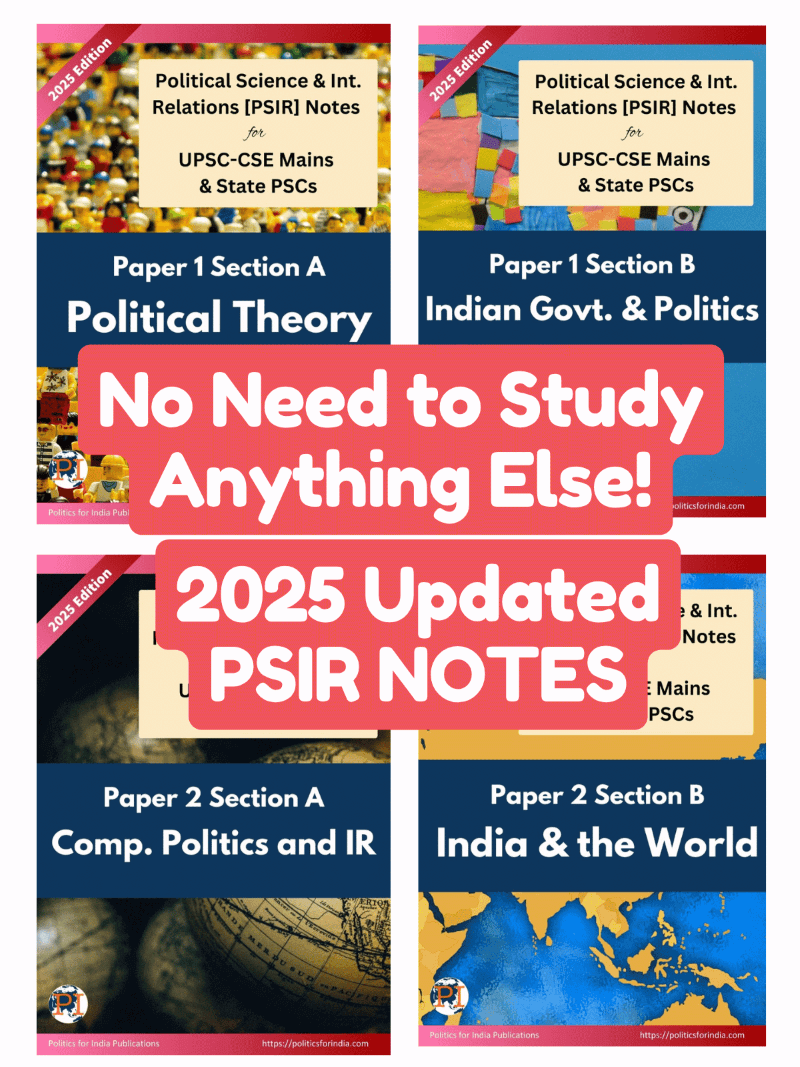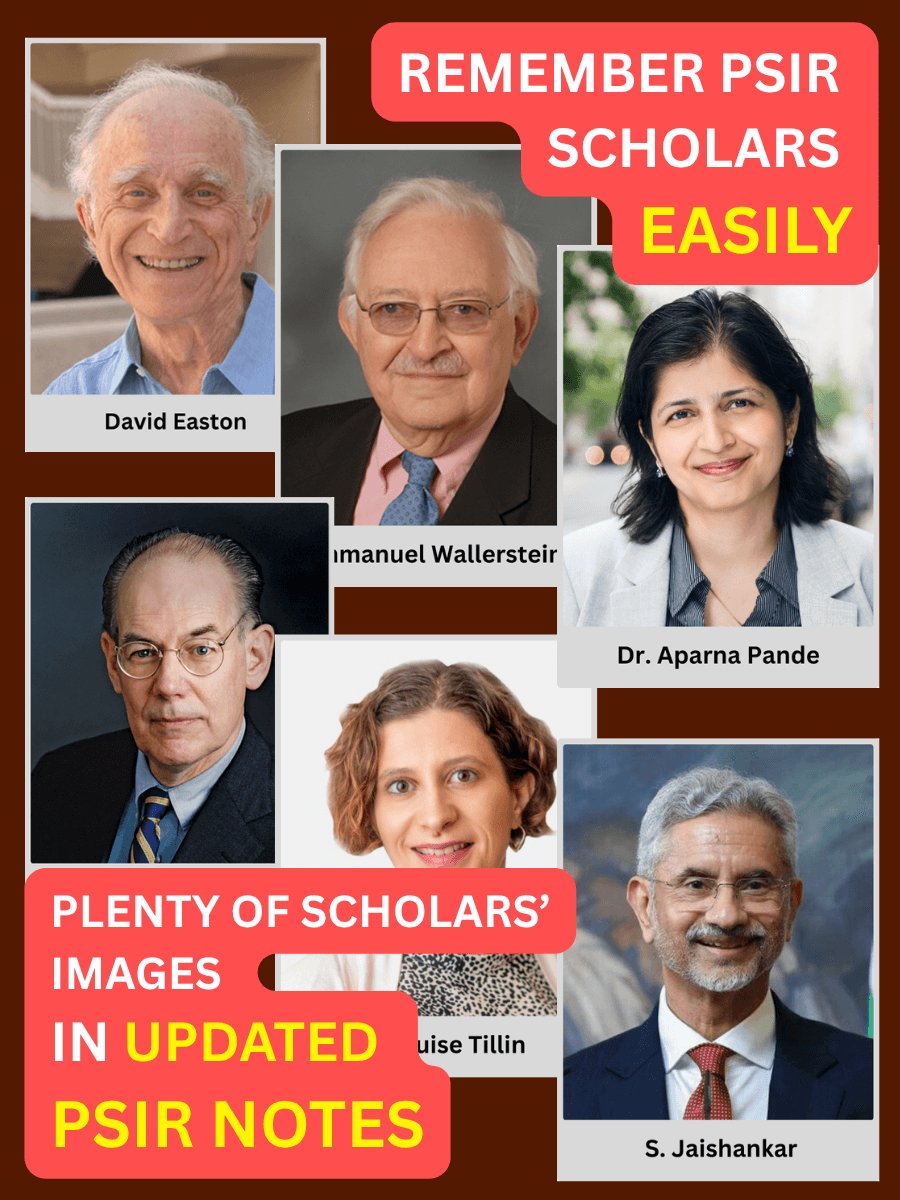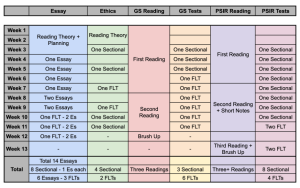1] Introduction
Some time back, we had written a post on answer writing in UPSC Mains (check here). That post discussed a generic approach to answer writing. The approach discussed in that post is largely sufficient for General Studies. However, there are some finer points which we need to look at, while approaching answer writing in a theoretical subject like political science or sociology.
In PSIR, or a similar subject, just writing an answer that satisfy the demand of the question is not sufficient. We also need to write the answer which will resonate with the reader. Which, the reader will understand and like, and by reading which, the examiner will give us maximum marks.
One of the important consideration in this process is then, substantiating the arguments which we make in answer writing. Because at the end, the entire discipline of political science is about argument, counter-argument, debate and discussion. Further, since political science is not an exact science, the statements done are never factual, instead, they are always someone’s opinions.
So, when we write in exam, it is like we presenting our own opinion on the subject matter to the examiner. In such scenario, two important parameters become important. The first being clarity of our communication, and the second being the strength of our communication.
Regarding first consideration i.e. clarity of communication, it comes from we ourselves having clarity on the subject matter. This should be coupled with the use of simple language, and an active effort to explain our viewpoint to the examiner.
In this article, we will focus on second criteria i.e. strength of our communication.
2] What is an Argument
Almost everything we say or write in PSIR can be said to be an argument. Please know that there is no absolute truth in a subject like Political Science. What we say, and what anyone else also says, are essentially opinions or arguments. For example, when Plato says that the institution of Philosopher King is best, it does not mean that it is absolute truth that Philosopher King is best form of state. It just means that, according to Plato, the Philosopher King is the best option we have.
Similarly, when Popper criticizes Plato as a totalitarian thinker, it again doesn’t mean that Plato is totalitarian thinker per se. Rather, Plato is totalitarian thinker ‘from the perspective of Karl Popper’.
The next logical question is, if everything is so subjective, what makes the literature of these scholars so special. If what they say have same value as what we can say, why are they given such a high position in academics?
3] Substantiating the Argument
Answer to the question raised in previous section is, that the arguments or opinions of these scholars are backed up by reasoning, by logic and by so many other such means. Because these are backed up like this, it becomes very difficult to refute them and establish a counter-argument. Thus, the ideas of these scholar assume a very high position in academics, and they are then treated as ‘father/originators’ of the discipline.
Thus, when we try to say something, when we try to write something in our answers, we should also rely on similar instruments of backing up our opinions. This will ensure that our answers / our opinions become difficult to counter, have high academic value, and that we get very good marks for every question.
The ways in which we can back-up our argument can be divided into three major types. These three types are also known as three pramans (evidences) in Vedic literature. These are:
- Pratyaksha Praman – Direct Evidence i.e. Using facts, statistics and data
- Anuman Praman – Logical Evidence i.e. by use of logic
- Shabda Praman – By quoting relevant authority e.g. by quoting other scholars/authorities
A] Pratyaksha Praman (Direct Evidence)
This is one of the simplest ways we can substantiate our argument. For example, if we want to suggest which model of economy i.e. capitalism or socialism is better, we can say something like… the growth rate of India during socialistic economy model was like 4-5%, however after liberalization it is 7-9%. The poverty rate before liberalization was such and such… and afterwards it is so and so… hence the capitalist model of economy is better.
When our argument is backed by use of some statistics, or data, or sometimes a single fact, it becomes very difficult to deny our position. Thus, it gives strength to our argument.
However, it is also true that quoting data is not possible for everything. Everything may not have a real-life example to give and we may have to use other instruments to back up our argument.
B] Anuman Praman (Use of Logic)
The reach of logic is much superior to the reality. Hence it is used everywhere to prove a point. For example, Rawls make use of Logic to arrive at his three principles of justice. He makes us go through a imaginary situation (veil of ignorance) and suggests that the conclusions he has given will be the best possible conclusions in such a situation. The same methodology was used by Socrates to prove that the wises man in indeed a fool, and by Plato to prove that the institution of Philosopher king is best.
Various methods/techniques that can be used in logic are- logical reasoning, giving analogies or making inferences. For example, if economic policies lead to growth in other countries, they might work similarly in India. You can also draw parallels to similar situations. For instance, comparing political reforms in one country to another to predict outcomes.
C] Shabda Praman (Quoting Established Authorities)
Apart from the two ways mentioned above, quoting recognized scholars and authorities lends credibility to our argument. This method leverages the expertise and research of others to bolster your points.
In this, you can cite political science scholars who have researched the topic extensively. For example, you may refer to Karl Popper while criticizing Plato, or refer Gandhi while criticizing Machiavelli. .
Quoting other scholars or other authorities is a very powerful way to substantiate our argument. These personalities are often taken as authorities in their respective fields and their statements are taken for face value. Nobody asks for a proof when Gandhi or Ambedkar has said something.
4] Conclusion
In reality, you will have to rely on mix of these techniques. While sometimes you may have facts and data, other times you can rely on some scholar’s statements to back up your argument. However, the techniques that helps often is relying on logic. When we use logic, we are exposed. The reader gets to see the level of our understanding. If we’ve studied nicely, thought about the topic beforehand, we will have a good and deep logic. Our points will make sense, evaluator will agree with what we’re saying, and give us very good marks. If we haven’t taken the efforts while studying, we’ll be exposed for lack of our knowledge. If it’s not a final exam, even this is a good news for us, because then we can start taking things seriously.
Please know that nobody can master these techniques overnight. It’s easy to learn these through a single article, but ultimately it takes enough practice to make them part of your routine language. So do that and your answers will definitely standout. Best wishes!









